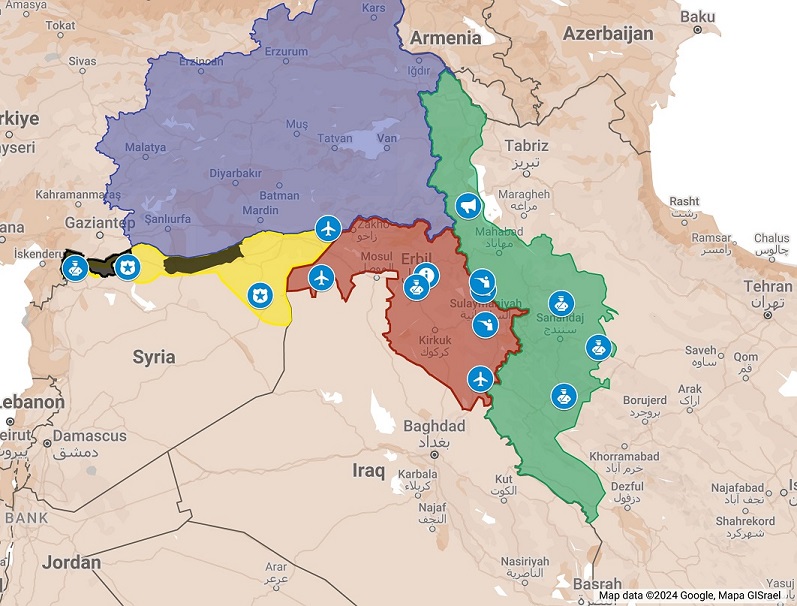1.5K
A weekly brief of events occurred in the Kurdistan regions of Iran, Iraq, Syria, and Turkey.
Iran
- Iran’s parliamentary elections recorded their lowest turnout ever at 41 percent. Iran’s dire economic situation and the massive anti-government protests that began in 2022 contributed to the abysmal turnout, which resulted in massive gains for Iran’s hardliners. The hardliners’ decisive victory caused the Iranian rial to plunge to an all-time low on Monday. Iranian Kurdistan boycotted the elections, though the Kurdish-majority province of Urmia, which has been dominated by pro-regime Azeri politicians, saw Kurds win seven of twelve seats. Concurrently, Iran’s Kurdish parties expressed their view that the low turnout was a sign of victory over the regime.
- Iranian border guards killed a Kurdish border porter (kolbar) named Ali Zarghami near Saqqez and another named Kawan Amjadi near Sardasht. According to the Hengaw Organization for Human Rights, the Iranian regime killed four kolbars and wounded 63 in February. Separately, the regime arrested three Kurds in Diwandara, two Kurdish teenagers in Saqqez and Bokan, a Kurdish athlete accused of criticizing a political candidate in Qorveh, and a Kurdish activist in Kermanshah.
Iraq
- President of Kurdistan Region Nichervan Barzani declared Iraqi Kurdistan’s parliamentary elections would be held on June 10. These elections will be supervised by Iraq’s Independent High Electoral Commission (IHEC) after Iraq’s Federal Supreme Court annulled Iraqi Kurdistan’s election laws and dissolved the Kurdistan Parliament’s quota seats for Christians and Turkmen. Iraqi Kurdistan’s Turkmen and Christian parties are still protesting the Federal Supreme Court’s decision to do away with their seats, and Iraqi Kurdistan’s parliamentary elections were previously delayed by political disagreements that led to the Kurdistan’s Parliament’s period being extended by one year.
- Former President of Kurdistan Region and current head of the Kurdistan Democratic Party (KDP) Masoud Barzani expressed concerns about the Federal Supreme Court’s ruling on Iraqi Kurdistan’s election laws during an interview with Mont Carlo International. “If Iraq adopts what has been agreed upon and returns to democracy and basic principles—participation, consensus, balance—then it is possible to save Iraq from the crisis it is going through,” said Barzani. Barzani also warned that a U.S. withdrawal from Iraq would lead to a replay of the 2011 U.S. withdrawal that led to the rise of ISIS (Da’esh).
- On Friday, a suspected Turkish drone struck an office of the Kurdistan Society Freedom Movement (Tavgari Azadi) in Sulaymaniyah Governorate’s Kalar District, killing one person. Tavgari Azadi was established in 2014 and is considered an offshoot of the Kurdistan Workers’ Party (PKK). On Saturday, a Kurdish doctor named Abdulkadir Toprak was assassinated in Sulaymaniyah. Toprak was originally from Turkey and had resided in Iraqi Kurdistan for over a decade after being persecuted by the Turkish government. Finally, Turkish drones killed two members of the Sinjar Resistance Units (YBS) on Thursday in the Yazidi district of Shingal (Sinjar).
Syria
- Consecutive Turkish airstrikes on four vehicles near Direk (Al-Malikiyah) killed three Christian officers of the Autonomous Administration of North and East Syria’s (AANES) Internal Security Forces (Asayesh) on Wednesday. The Asayesh claimed the initial strikes targeted two vehicles, and subsequent strikes targeted the quick reaction force sent to aid the victims and the vehicle carrying the wounded from the scene of the attacks. Separately, the Asayesh said it arrested 13 Da’esh terrorists, 31 Assad regime militants, and three members of Turkish-backed groups during security operations in al Hasakah Governorate. Simultaneously, the Syrian Democratic Forces (SDF) released footage of the seizure of twenty million captagon pills in Manbij. The SDF claimed the drugs originated in the Assad regime-controlled coastal city of Tartus. The Assad regime and pro-Assad regime militias produce and smuggle captagon to generate revenue amid regional and international efforts to counter the trade.
- The Syrian Observatory for Human Rights (SOHR) reported thirty-seven arbitrary arrests and kidnappings conducted by Turkish intelligence and their Syrian proxies in the occupied Afrin during February. In the past week, twelve Kurds, including elderly individuals, were reportedly targeted for their alleged association with the former Kurdish administration before the Turkish invasion into Afrin.
Turkey
- Turkish police arrested three supporters of the pro-Kurdish Peoples’ Equality and Democracy Party (Dem Party) in Istanbul. The Turkish government’s crackdown, which includes mass arrests and tightening internet censorship, comes as the Dem Party gears up for local elections on March 31. That said, the Dem Party released a statement commemorating the ninth anniversary of the peace process between the Turkish government and the PKK known as the Dolmabahce Peace Accord. “The way out of the multiple crises that Turkey is in is through defending the historical Kurdish peace with courage and determination,” read the Dem Party statement. In recent weeks, thousands of Kurds in the diaspora have united in ongoing rallies, demanding an end to the government-imposed isolation on the imprisoned Kurdish leader, Abdullah Ocalan. Concurrently, Kurdish politicians continue their advocacy for a renewed peace process to address the Kurdish issue in Turkey.

